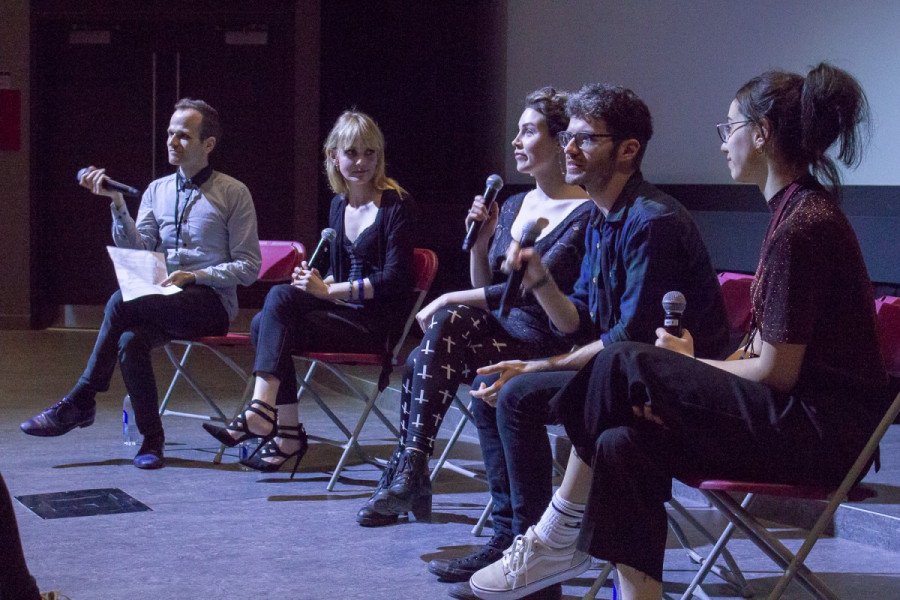Film Review at Concordia’s Film Festival: “Pre-Drink”
A Look At Gender Through Lemire’s Work of Art
A woman is getting ready for a night out, she paints her nails by the window of her dimly lit bedroom. Staring at her reflection in the mirror, she cocks her head from left to right, and slips out of her shirt. There she is, in her bra, admiring herself. She continues to strip down, giving both the audience, and herself, a frontal view of her pale breasts. She cups them, but not in a sexual way. She is marvelling at herself, as if discovering her body for the first time.
This is how Marc-Antoine Lemire’s short film, “Pre-Drink” begins. Lemire’s vision won a Short-Cuts Award at the Toronto International Film Festival, as the Best Canadian Film.
The story is about Alexe, a trans woman, and Carl, her gay best friend. Prior to going out, numerous glasses of wine are consumed in Alexe’s bedroom. Both find themselves looking at the other with a new set of eyes. One thing leads to another, and the pair eventually break all boundaries, falling into bed together.
Emotional, raw, and realistic, “Pre-Drink” is a film that cannot, and I believe, will not, conform to any genre. Although the culminating point of the story is the sexual intercourse between Alexe and Carl, it is not the movie’s only angle.
Reading the synopsis, one could mistake the movie for a comedy, as it states that “Alexe and Carl decide to have sex,” as though it were a mere job to get done. It could also be thought of as a romantic story, where the tender-hearted readers hope for feelings to flourish between two lifelong friends. It could as well be a film with a primary focus on a transgender person’s transition.
In all truths, the movie is all of this combined.
It is comical and focuses on Alexe’s transitioning. At some point, following their sexual experience, viewers can sense Alexe’s frustration at Carl’s lack of sensitivity towards what they had just shared. As he shrugs it off, reminding her of the people waiting for them at the bar, she feels as though they are not on the same wavelength. This scene plays a role in the brief, almost impalpable romantic aspect on the story, for this event is eventually dismissed by Alexe as well.
As she gets up from her bed, and back to her boudoir, Alexe is staring at herself again, ignoring Carl’s pleas to leave. “I am making you wait,” she says, smirking. She then proceeds in an iconic feminine action: she applies her cream-coloured lipstick, flicks her hair, then smiles wickedly at her reflection.
End credits and thunderous applause resonate in Concordia’s auditorium.
Three individuals pop out of their seats. Smiling at the crowd, they make their way to the stage to participate on the Gender Conference which followed the screening of “Pre-Drink.”

On the left, Gabrielle Boulianne-Tremblay quietly sits at the podium. While not being part of the cast of “Pre-Drink”, Boulianne-Tremblay was a guest at this year’s CFF because of her stature as an acclaimed transgender actress in Canada. She was nominated last year for the Canadian Screen Awards, for an Espoirs du Cinéma Québécois, and a Mammouth⎯a Quebec prize offered to individuals who inspired positive change in society.
Next to her is Pascale Drevillon, who plays Alexe in “Pre-Drink”. This year, the UQAM alumni in Theatre Acting was the first transgender actress to be part of an institutional theatre piece. It was called Hamster by Marianne Dansereau, which played at Théâtre La Licorne. She was also the first to be cast for a lead role in a television programme, Catastrophe, on Super Ecran.
The final panelist on the far right is Lemire, the director of the film. Lemire is based in Montreal and has a Bachelor of Fine Arts in Film Studies. Interested in daring, raw, and sensitive art, he prefers to put an emphasis on a character’s point of view throughout the story rather than focusing on the technical aspects.
“I was not looking to make a movie about sexuality,” Lemire explains. “The movie is about friendship before anything else. I don’t see [inclusion] as an objective of mine. I am for diversity, I am for every type of education, but I don’t make it as an objective of mine to represent everyone.”
Drevillon insists that, although she plays a transgender woman going through changes in “Pre-Drink,” parallels should not be drawn between them.
“You can call me misinformed, brainwashed and wrong, but I love it.This extreme femininity is like my armour, I wear it to be fierce, and be a freaking warrior on the outside, when on the inside, I just want to stay at home and watch Netflix. At the end of the day, you just gotta find a balance, and your peace with that.”⎯ Pascale Drevillon
“Yes, it’s a trans character, and actresses like Gab [Boulianne-Tremblay] and I are happy to portray them,” Drevillon says, “but we’re completely different. Alexe is not living her transition the same way I did.”
Boulianne-Tremblay furthers this thought by explaining that characters can sometimes be considered as stereotypical, “but it remains a reality. It’s still happening, it’s still real.”
This statement opens up the idea of gender, and questions the binary system.
Drevillon shares that she has been turned down for a role for failing to look “trans enough.”
“Gender is something personal that belongs to us,” she says. “However, it is also something that we inevitably see through the other person’s eye. So, we always wonder what kind of image we’re selling, but it’s also very different from what we’re feeling inside.”
She thanks Lemire for presenting her with a character such as Alexe, as she believes the role is very different from how most transgender people are portrayed in the media.
“It’s also good that we’re breaking away from the gender binary,” Boulianne-Tremblay adds. “So we’re also introduced to new types of trans people. We’re no longer in that part of the intense procedures and extreme femininity. We’re just bodies, and we’re all different, and that’s okay.”
For a look at next years Concordia Film Festival, check out their website at https://www.concordiafilmfestival.com





